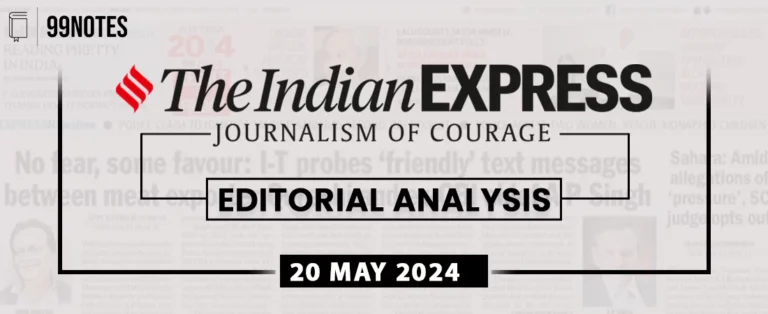14 September 2024 : The Hindu Editorial Analysis
1. The UN the world needs
(Source: Indian Express; Section: The Ideas Page; Page: 11)
| Topic: GS2– International Relations – Important International institutions, agencies and fora – their structure, mandate. |
| Context: |
| The article discusses Prime Minister Narendra Modi’s upcoming address at the UN Summit of the Future, which focuses on forging global consensus to address present and future challenges. |
Prime Minister Narendra Modi’s Upcoming Address at the UN Summit
- Prime Minister Narendra Modi is set to travel to New York to address the special global summit hosted by the United Nations on September 22-23, titled “The UN Summit of the Future.”
- This summit aims to create a “new international consensus” on how to foster a better present and ensure a secure future. This theme is especially relevant as the world currently stands at a pivotal moment, grappling with disruptive geopolitical and environmental challenges.
- While the summit’s theme is forward-looking, it has raised concerns among many regarding the future relevance of the UN itself.
The Crisis of Relevance Facing the United Nations
- The United Nations, founded nearly eight decades ago with 50 initial member countries, appears increasingly out of touch with modern global issues. The organization is often criticized for its inefficacy and inefficiency in addressing contemporary challenges, such as geopolitical tensions, wars, and global inequalities.
- As former UN Secretary-General Dag Hammarskjöld once remarked, the UN’s purpose is not to “bring us to heaven” but “save us from hell.” However, as the world becomes more fragmented by geopolitical interests, the UN struggles to play its intended role.
- This institutional malaise has prompted calls for reform from within the UN itself. Dennis Francis, President of the General Assembly, chose the theme “Rebuilding Trust and Reigniting Global Solidarity” for the 78th session held in September 2023.
- Similarly, current Secretary-General Antonio Guterres stressed the need to reform and modernize the multilateral system. Guterres emphasized that the world has changed, but the institutions established post-World War II have not kept pace.
Historical Influences and the Anglo-Saxon Dominance
- The UN’s current struggles can be traced back to early 20th-century Western thought, which heavily influenced the organization’s foundation. Western intellectuals like H.G. Wells and John Foster Dulles envisioned a world order dominated by Anglo-Saxon nations, particularly the U.S. and other English-speaking countries.
- This mindset laid the groundwork for the creation of the UN by figures such as Franklin D. Roosevelt and Winston Churchill. Wells even predicted that by the year 2000, English-speaking nations would govern much of the world.
- Although the UN has grown to include 193 member states, the legacy of Anglo-Saxon dominance has lingered. Initiatives like Brexit, AUKUS, and CANZUK reflect this enduring mindset.
- This imbalance in power distribution, favoring certain nations over others, has contributed to the UN’s inability to function as a truly representative and democratic global institution.
The UN’s Struggle with Global Issues
- As non-English-speaking nations have gained power and influence, they have begun to assert themselves in global affairs. However, the dominant powers often sidestep the UN rather than making it more democratic.
- For example, the UN has been ineffective in addressing major global crises, such as the wars in Ukraine and Gaza, as well as the climate change challenges dividing the Global North and South.
- The UN’s paralysis is starkly visible in the deadlock over key global issues. The WTO’s dispute resolution mechanism has been nonfunctional since 2019, owing to the U.S.’s refusal to ratify the appointment of new judges.
- Moreover, over 600 bilateral and regional trade agreements remain unresolved. India’s UN representative, Ruchira Kamboj, highlighted this crisis during a February 2023 plenary session, questioning why the Security Council has failed to resolve the ongoing Ukraine conflict.
India’s Role and the Call for UN Reform
- India has been vocal about the need for reforms within the UN. External Affairs Minister S. Jaishankar astutely noted that asking the five permanent members of the Security Council to relinquish some of their power is unlikely to yield results. The imbalance of power remains a significant obstacle to reform.
- As Prime Minister Modi prepares to address the UN Summit, he may also take the opportunity to emphasize the need for India and other emerging nations to have a greater say in global governance.
- The future of the UN, in many ways, hinges on its ability to become more inclusive, representative, and effective in addressing the challenges of the 21st century.
.
| What are the Proposals to Reform of the UN? |
|
Reforming the UNSC: Expanding Permanent Membership:
Abolishing or Limiting the Veto Power:
Inclusive Representation for the Global South:
Streamlining Bureaucracy and Decision-Making: Reducing Inefficiencies in Administrative Processes:
Enhancing Accountability and Transparency:
Strengthening Financial Stability: Fair and Equitable Distribution of Financial Contributions: \
Addressing Arrears and Fiscal Constraints:
Reforming the United Nations is a complex and long-term process, requiring consensus among its member states. However, implementing these proposals can address some of the most pressing issues and make the organization more effective, transparent, and inclusive. |
| PYQ: What are the main functions of the United Nations Economic and Social Council (ECOSOC)? Explain different functional commissions attached to it. (150 words/10m) (UPSC CSE (M) GS-2 2017) |
| Practice Question: Discuss the challenges faced by the United Nations in addressing contemporary global issues. In light of these challenges, analyze the need for reforms within the UN system and the role emerging nations like India can play in shaping a more inclusive and effective multilateral organization. (250 words/15 m) |



